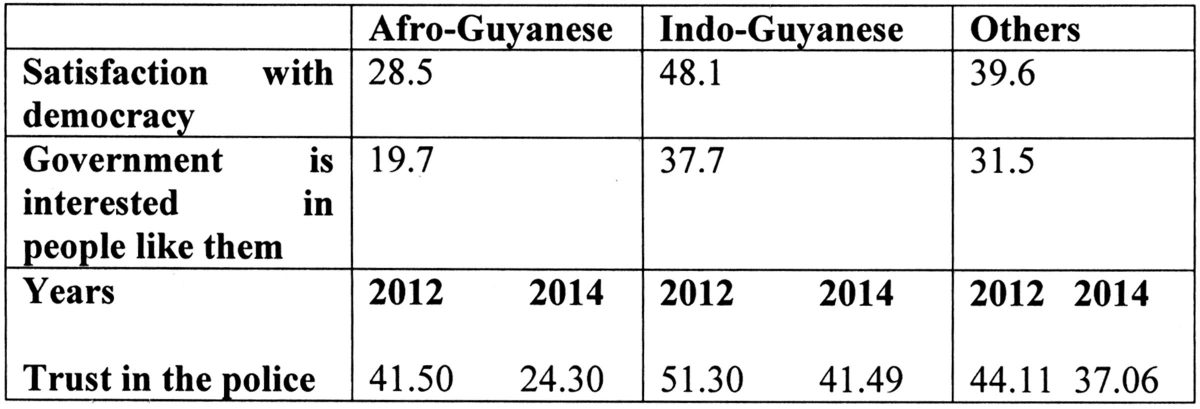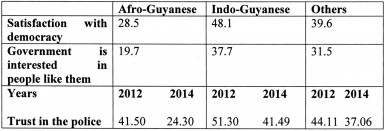After former president Bharrat Jagdeo launched his extremist ethnic salvoes at Babu John, I had occasion to predict in this column that worse was yet to come. A mere glance at the numbers below indicates why such a deduction was easy to make.
Ethnic perceptions of governance
*Latin American Public Opinion Project, 2014: www.lapopsurveys.org
It is good that many citizens and non-citizens alike still find Mr. Jagdeo’s language distasteful, and he has certainly again contributed to more and more of our people having less and less faith in their governance institutions.

When in a normal country over 60% of a party’s core traditional supporters believe that their party no longer cares about them, elections are, for the most part, the only honourable way for that party to relinquish government, renew itself in opposition and come again.
But because of our unusual ethnic condition and the destructive path the PPP took to hold on to government, no such relatively easy option exists. That party’s only choice now is to follow the harmful road it has chosen to its logical conclusion.
The PPP leadership faces what I have repeatedly called a “personal security dilemma”. Its loss of office would trigger investigations into almost every facet of governance, and if half of what is said about its activities in government is true, such enquiries must lead to severe punishment and possible imprisonment. A large swathe of the population lives expectantly for such a day, and knowing this, some opposition politicians have already promised its coming.
The only way for the PPP to win back a significant number of those who have been turning from it is to present them with the scariest vision of Armageddon under a new government. But of course, pitching race against race cannot be good for Guyana, now or in the future.
But the figures also indicate that even before the adoption of its current extremist ethnicised approach, the efforts of the PPP to sustain itself in government had effectively brought it to a dead end in terms of ethnic reconciliation.
When, after 22 years in government, more than 80% of a major ethnic group (Africans in this survey) believe that the government does not care about them, the ethnic policy of the regime (assuming it has one and that it is to mould our disparate groups into a nation) has been a patent failure!
The PPP cannot deny that in this matter it has failed, but as usual contends that it has tried its best. It normally blames the opposition for – as the former president claimed -beating the drums of racism so as to hold on to its own ethnic support base.
But even if this is true, it does not exculpate the PPP. After such a long time in government, all its complaint does is confirm that it does not have the capacity to mould this country into a nation.
When we add this to the regime’s current extremist efforts at ethnic mobilisation, it becomes quite clear that even – heaven forbid – should it win the coming elections, the PPP cannot rule in a manner that will bring sustained security and rounded development to all the people of Guyana.
We now need to consider how true is the PPP’s story that it has tried to remove ethnic discrimination. In `What we have now is not working in any meaningful manner’ (SN 29/06/2011), I argued in more detail that the PPP’s approach has been quite the opposite.
The party’s more important policy-making bodies are controlled by a democratic centralist oligarchy that has historically been and still is made up largely of Indians.
The higher policy-making and implementation sectors of the state, from the presidency through the cabinet, to the heads of the various ministries and departments are now similarly ethnically constructed, although this has not been so historically.
So far as the private sector is concerned, one only needs to glance in the telephone yellow pages to substantiate the well known fact that Indians dominate the commercial and business sectors. So much so that one of the greatest complaints heard daily from African businesspeople in various walks of life is that the playing field is not level.
Whereas the PPP has deliberately established arrangements to address Indian marginalisation in the public sector and parts of the private sector (e.g. the construction sector, where multi-nationals have dominated), it has done little to meaningfully facilitate African participation in the private sector.
Surely any government that sought ethnic equality would by now have in place policies deliberately designed to facilitate wider African participation.
Interestingly, and with a tinge of humour, the same 2014 LAPOP survey indicated that the security force (Guyana Defence Force) is perhaps the most trusted governmental institution. Fifty-eight percent of those surveyed trust the army while only 45.5% trust the cabinet and even less – 38.6% – trust the political parties.
It certainly confirms the desperate situation in which the PPP finds itself when it tries to associate possibly the most respected governmental institution in the land with the African opposition leadership and kicking down Indian doors.
Furthermore, if my memory serves me correctly, although I thought and still think that his resort to capital punishment was unacceptable, it was not the PPP but Desmond Hoyte and his PNC who effectively brought an end to the kick down the door phenomenon.
Is it ironic or should we have expected that the leadership of the governmental institution in which, apart from the police, the people have the least faith would attempt to destroy the institution in which they have the most?
henryjeffrey@yahoo.com







